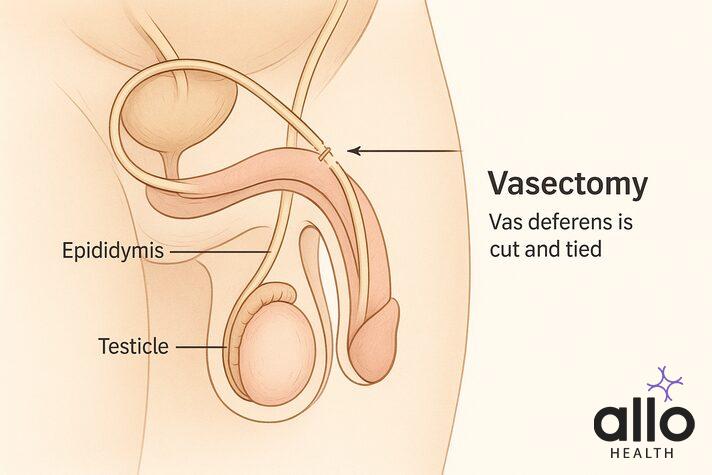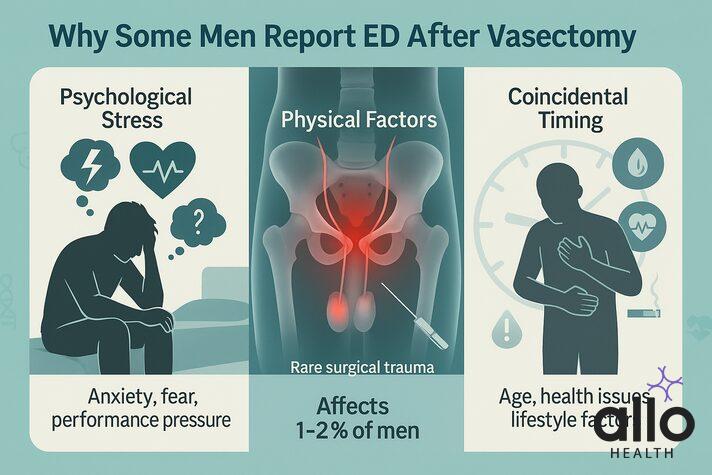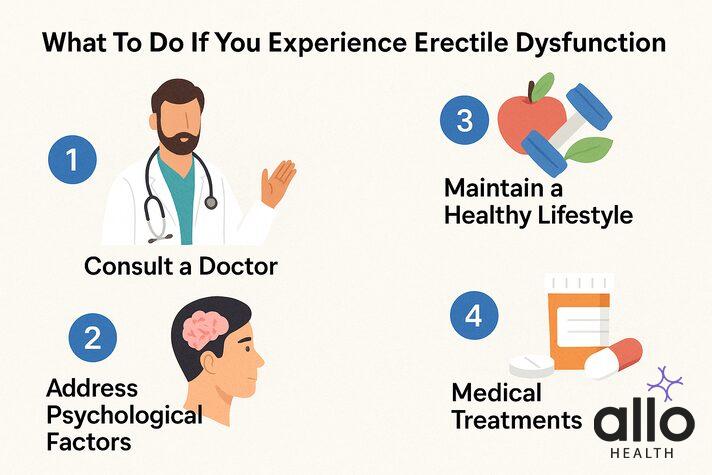Is There a Link Between Vasectomy and Erectile Dysfunction?
Written by Dr. Deepali Anand

Dr. Deepali is a medical writer and healthcare professional with a background in clinical surgery and patient care. Having transitioned from active clinical practice to medical communications, she specializes in bridging the gap between complex clinical data and patient education. Dr. Deepali is dedicated to creating evidence-based content that is grounded in scientific rigor and empathy, ensuring that sensitive topics like sexual wellness and mental health are accessible and empowering for every reader.
•
September 5, 2025
Our experts continually monitor the health and wellness space, and we update our articles when new information becomes available.

Quick Read
No, vasectomy does not cause erectile dysfunction. This procedure only blocks sperm transport and doesn't touch the nerves, blood vessels, or hormones that control erections; your testosterone levels and sexual function remain completely unchanged. While some men do report ED after vasectomy, research shows this is typically due to psychological factors like anxiety about the procedure, relationship stress, or simply coincidental timing with age-related health changes. In fact, many studies find that men often experience improved sexual satisfaction after vasectomy, likely because pregnancy concerns are eliminated. If you do experience ED after the procedure, it's worth talking to your doctor to address any underlying causes, but you can feel confident that the vasectomy itself isn't the culprit.
Erectile dysfunction after vasectomy is one of the most common concerns men have when considering or recovering from this procedure. The reassuring answer is no, a vasectomy does not directly affect your ability to get or keep an erection.
In this article, we’ll clear up the myths, explain the science behind why vasectomy doesn’t interfere with erections or hormones, explore the rare reasons some men still report erection problems, and share practical tips on when to seek help and how to manage ED if it does occur.
Will Vasectomy cause Erectile Dysfunction?
A common doubt after getting a vasectomy procedure is, “Can vasectomy cause erectile dysfunction?” The short answer is no. Vasectomy does not cause erectile dysfunction or any other sexual dysfunction.
It’s a common misconception that vasectomy can lead to impotence, but research shows no evidence of any direct physical or hormonal link.
A vasectomy only blocks sperm from entering the semen by tying or sealing the vas deferens (the tube that carries sperm).
Although sperm are blocked, everything else: ejaculation, seminal fluid production, orgasm, and erection remains the same.
Let’s understand why erectile dysfunction after vasectomy is largely a myth.
Allo asks
What’s Your Biggest Concern About Vasectomy?

Why Vasectomy Doesn’t Cause Erectile Dysfunction
Anatomical Difference
- A vasectomy involves cutting or sealing the vas deferens, the tube that carries sperm from the testicles to the urethra.
- The procedure does not involve or affect the nerves, blood vessels, or structures of the penis.
- Erections depend on nerve signals, blood flow, and smooth muscle relaxation in the penis, none of which are disturbed by vasectomy.
- A vasectomy also won’t:
- affect masculinity or sexuality
- reduce testosterone levels
- change the volume of semen significantly
- damage other sexual organs
- cause severe long-term pain
Hormonal Changes
Research[1] confirms that vasectomy has no impact on testosterone or other sex hormones. Your testicles continue producing testosterone just as before the surgery.
So, anatomically and hormonally, the answer is clear: vasectomy erectile dysfunction is not a direct outcome of the procedure.
A vasectomy only blocks the pathway for sperm; it doesn’t interfere with your erections, hormones, or pleasure. Most men find their sex life feels the same, if not better, after the procedure

Why Some Men Report ED After Vasectomy
Interestingly, research shows quite the opposite: many men report high sexual satisfaction, sexual performance, and even better erections after vasectomy. For instance:
A study[2] showed vasectomy had a positive impact on sexual function, with 67% of patients reporting improvement in their International Index of Erectile Function (IIEF).
But yes, some men do experience erection issues after a vasectomy. These are usually linked to psychological or rare physical factors rather than the surgery itself.
Psychological Stress
- Anxiety and stress about the surgery can trigger temporary erection issues.
- Fear of reduced masculinity(male sterilization), fertility, or sexual identity can affect erections.
- Performance anxiety after surgery can impact confidence.
- Relationship stress or conflict can also interfere with arousal.
A study[3] found that among men who believed their ED was caused by vasectomy, 22% reported that the vasectomy decision was imposed by their partner, compared to just 4% of men without ED. This highlights the strong psychological issues role in male sexual dysfunction post-surgery.
Physical Factors (Rare)
Post-Vasectomy Pain Syndrome (PVPS):
A rare condition (1–2% of men) where chronic testicular pain develops after the surgical procedure, sometimes interfering with sexual life[4].
Surgical Trauma:
Very rarely, injury to nerves or blood vessels during surgery may cause issues, but this is highly uncommon, as vasectomy is a minimally invasive procedure done on an outpatient basis[5].
Coincidental Timing
Sometimes ED symptoms appear around the same age or stage of life when men are already at risk due to:
- Aging
- Health issues (diabetes, heart disease, hypertension)
- Lifestyle habits (smoking, alcohol, stress)
This makes it easy to link ED to the vasectomy mistakenly.
Erection After Vasectomy
When Can You Resume Sex Post-Vasectomy
It’s common to have mild pain, swelling, or bruising for a few days to weeks after the procedure.
Erections are possible immediately after surgery, but it’s best to wait until discomfort eases.
Most doctors recommend waiting 1–2 weeks before resuming sexual activity to prevent incision reopening or infection.
Erection Quality After Vasectomy
A vasectomy doesn’t affect testosterone, penile nerves, or blood flow. If you had normal erections before, your erections after a vasectomy will remain the same.
Any changes are usually due to temporary postoperative discomfort or unrelated medical issues.
Vasectomy Reversal and Erectile Function
A vasectomy reversal also does not cause erectile dysfunction. This microsurgical procedure reconnects the vas deferens (the sperm-carrying tube).
It does not affect testosterone levels or the erection mechanisms. Men can continue normal sexual relations without fear of impotence.
When To See a Doctor
You should consult a doctor if you notice:
- Persistent pain during erections
- Swelling or discomfort beyond the expected recovery period (2 weeks)
- Sudden or lasting changes in erectile function
These may signal infection, hematoma, or (rarely) PVPS, but are not direct consequences of vasectomy itself.
Also, remember: ED can sometimes be a red flag for underlying health conditions like diabetes, poor cardiovascular health, or hormonal imbalance.

What To Do If You Experience Erectile Dysfunction
1. Consult a Doctor
A healthcare provider can rule out serious causes and guide you toward the right treatment.
2. Address Psychological Factors
Anxiety, stress, or partner-related issues can improve with counseling, CBT, or stress-relief techniques.
3. Maintain a Healthy Lifestyle
Regular exercise, balanced nutrition, and adequate sleep support overall sexual health.
4. Medical Treatments
Oral ED medications like PDE5 inhibitors (like sildenafil or tadalafil), vacuum devices, injections, or penile implants may be considered if needed.
Bottom Line
So, do vasectomy cause erectile dysfunction? The straightforward answer is no. Vasectomy doesn’t cause erectile dysfunction. At most, some men may experience temporary or indirect effects due to psychological stress, rare pain syndromes, or unrelated health conditions.
ED is usually not caused by vasectomy itself; it’s more often linked to other medical or psychological factors.
If you’re worried, talk openly with your doctor. With proper evaluation and treatment, your sex life after vasectomy can remain healthy and satisfying.
Disclaimer
The following blog article provides general information and insights on various topics. However, it is important to note that the information presented is not intended as professional advice in any specific field or area. The content of this blog is for general educational and informational purposes only. The content should not be interpreted as endorsement, recommendation, or guarantee of any product, service, or information mentioned. Readers are solely responsible for the decisions and actions they take based on the information provided in this blog. It is essential to exercise individual judgment, critical thinking, and personal responsibility when applying or implementing any information or suggestions discussed in the blog.
Most Asked Questions
Does a vasectomy cause impotence or erectile dysfunction?
No. A vasectomy only blocks sperm from entering semen — it does not affect testosterone, blood flow, or the nerves responsible for erections. Most men continue to have normal sexual function after the procedure.
Can you take sildenafil (Viagra) after a vasectomy?
Yes. Sildenafil and other ED medications are safe to use after a vasectomy if needed. If you’re having erection issues, it’s best to speak with a doctor to rule out other causes like stress, diabetes, or blood pressure problems.
Does vasectomy lower testosterone levels?
No. Vasectomy has no effect on testosterone or other sex hormones. Your testicles keep producing hormones exactly as before, so your masculinity and sex drive are not reduced.
Why do some men report ED after vasectomy if it doesn’t cause it?
In most cases, erection problems after vasectomy are due to psychological factors like anxiety, stress, or relationship concerns. Rarely, pain or other unrelated health issues may play a role.
When should I see a doctor about erection issues after vasectomy?
If you notice persistent pain, swelling, or ongoing erectile dysfunction beyond the 1–2 week recovery period, it’s a good idea to consult a doctor. This helps rule out infections, rare post-vasectomy pain, or underlying health conditions.
Sources
- 1.
Assessment of sexual function in patients undergoing vasectomy using the international index of erectile function
- 2.
Vasectomy and male sexual dysfunction risk
- 3.
Post-vasectomy pain syndrome: diagnosis, management and treatment options
- 4.
Review of Vasectomy Complications and Safety Concerns
- 5.
Vasectomy


